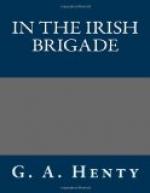“I quite see that that is out of the question. All I can hope for is, that such of them as recognize my likeness to my father will draw up a paper saying so, and will attest it before a notary, having as witnesses men of weight and honour equal to their own. The production of such certificates could not but have a strong influence in my favour.”
“I will most willingly sign such a document,” the duke said, “and four of my best-known generals can sign as witnesses to my signature.”
“I thank you most heartily, sir. Such a document should, in itself, be considered as ample proof of my strong resemblance to my father.”
“That may or may not be,” the duke said, “but do not be content with that. Get as many of the others as possible to make similar declarations. One man may see a likeness where another does not, but if a dozen men agree in recognizing it, their declarations must have a great weight. Certainly no Irish judge would doubt the testimony of so many men, whose families and whose deeds are so well known to them.”
From Dauphiny, Gerald travelled first into Spain, and the three Irish officers there whose names were on his list all recognized the likeness, even before he told them his name. He put the question to them in a general way.
“I have learned, sir, that the name I bear is not my own, that I am the son of an officer who was killed in the siege of Limerick. May I ask you if you can recognize any likeness between myself and any officer with whom you were well acquainted there?”
In each case, after a little consideration, they declared that he must be the son of James O’Carroll. All remembered that their comrade’s wife had borne a son, shortly before the end of the siege. They remembered her death, but none had heard what became of the child, for in the excitement of the closing scenes, and of the preparation for the march immediately afterwards, they had had little time on their hands, and it was hitherto supposed that it had, like so many other infants, perished miserably. They willingly signed documents, similar to that which he had received from Berwick.
He met with almost equal success on the northern frontier, only two out of eight officers failing to identify him by his likeness; until he mentioned his name, when they, too, acknowledged that, now they recalled James O’Carroll’s face, they saw that the likeness was a striking one.
Having obtained these documents, he resumed civilian attire, and, riding by crossroads, passed through Flanders to Sluys, without coming in contact with any body of the allied troops. There he had no difficulty in obtaining a passage to London, and on his arrival called upon Lord Godolphin, who received him cordially.
“So you have utilized your safe conduct, Captain Kennedy. I am glad to see my former captor, and I am as grateful as ever to you for the silence you maintained as to that affair. If it had been known to my enemies, I should never have heard the last of it. They would have made me such a laughingstock that I could scarcely have retained office.




